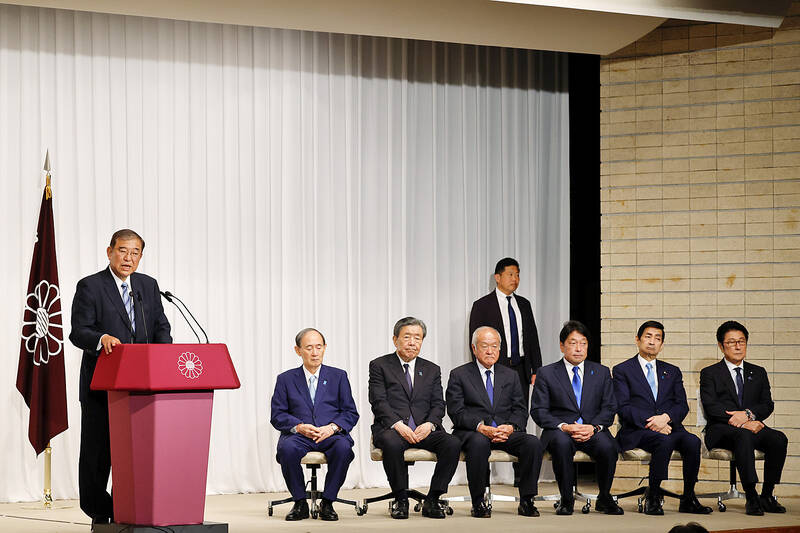The make-up of Japan’s future government was yesterday in flux after voters punished Japanese Prime Minister Shigeru Ishiba’s scandal-tainted coalition in a weekend snap election, leaving no party with a clear mandate to lead the world’s fourth-largest economy.
The uncertainty sent the yen to a three-month low as analysts prepared for days, or possibly weeks, of political wrangling to form a government and potentially a change of leader.
That comes as Japan faces economic headwinds, a tense security situation fueled by an assertive China and nuclear-armed North Korea, and a week before US voters head to the polls in another unpredictable election.

Photo: EPA-EFE
“We cannot allow not even a moment of stagnation, as we face very difficult situations both in our security and economic environments,” Ishiba told a news conference yesterday, pledging to continue as prime minister.
His Liberal Democratic Party (LDP) and its junior coalition partner, Komeito, took 215 seats in the lower house of parliament, down from 279, as voters punished the incumbents over a funding scandal and a cost-of-living crunch.
Two Cabinet ministers and Komeito’s leader, Keiichi Ishii, lost their seats.
The biggest winner of the night, the main opposition Constitutional Democratic Party of Japan (CDPJ), had 148 seats, up from 98 previously, but also still well short of the 233 majority.
A vote on who would take the prime ministership might be held in a special parliamentary session on Nov. 11, multiple ruling coalition sources told Kyodo News yesterday.
There remains uncertainty over whether Ishiba — who became prime minister less than a month ago — can survive after the drubbing. Smaller parties also made gains and their role in negotiations could prove key.
“It seems unlikely that he [Ishiba] will survive to lead a new government as prime minister ... though it is possible he could stay on as caretaker,” said Tobias Harris, founder of Japan Foresight, a political risk advisory firm.
In one bright spot, a record 73 women were elected into Japan’s male-dominated parliament, surpassing 54 at the 2009 election.
Support from smaller parties, such as the Democratic Party for the People (DPP) or the Japan Innovation Party (JIP), which won 28 and 38 seats respectively, could now be key for the LDP.
DPP head Yuichiro Tamaki and JIP leader Nobuyuki Baba have both said they would rule out joining the coalition, but are open to ad hoc cooperation on certain issues.
Ishiba echoed that sentiment, saying “at this moment in time, we are not anticipating a coalition” with other opposition parties.
The LDP would hold discussions with other parties and possibly take on some of their policy ideas, he added.
CDPJ leader Yoshihiko Noda has said he would work with other parties to try and oust the incumbents, although analysts see this as a more remote possibility.
The LDP has World War II history and the result marked its worst election since it briefly lost power in 2009 to a precursor of the CDPJ.
Ishiba, picked in a close-fought race to lead the LDP late last month, called the election a year before it was due in an effort to secure a public mandate.

The CIA has a message for Chinese government officials worried about their place in Chinese President Xi Jinping’s (習近平) government: Come work with us. The agency released two Mandarin-language videos on social media on Thursday inviting disgruntled officials to contact the CIA. The recruitment videos posted on YouTube and X racked up more than 5 million views combined in their first day. The outreach comes as CIA Director John Ratcliffe has vowed to boost the agency’s use of intelligence from human sources and its focus on China, which has recently targeted US officials with its own espionage operations. The videos are “aimed at

STEADFAST FRIEND: The bills encourage increased Taiwan-US engagement and address China’s distortion of UN Resolution 2758 to isolate Taiwan internationally The Presidential Office yesterday thanked the US House of Representatives for unanimously passing two Taiwan-related bills highlighting its solid support for Taiwan’s democracy and global participation, and for deepening bilateral relations. One of the bills, the Taiwan Assurance Implementation Act, requires the US Department of State to periodically review its guidelines for engagement with Taiwan, and report to the US Congress on the guidelines and plans to lift self-imposed limitations on US-Taiwan engagement. The other bill is the Taiwan International Solidarity Act, which clarifies that UN Resolution 2758 does not address the issue of the representation of Taiwan or its people in

US Indo-Pacific Commander Admiral Samuel Paparo on Friday expressed concern over the rate at which China is diversifying its military exercises, the Financial Times (FT) reported on Saturday. “The rates of change on the depth and breadth of their exercises is the one non-linear effect that I’ve seen in the last year that wakes me up at night or keeps me up at night,” Paparo was quoted by FT as saying while attending the annual Sedona Forum at the McCain Institute in Arizona. Paparo also expressed concern over the speed with which China was expanding its military. While the US

SHIFT: Taiwan’s better-than-expected first-quarter GDP and signs of weakness in the US have driven global capital back to emerging markets, the central bank head said The central bank yesterday blamed market speculation for the steep rise in the local currency, and urged exporters and financial institutions to stay calm and stop panic sell-offs to avoid hurting their own profitability. The nation’s top monetary policymaker said that it would step in, if necessary, to maintain order and stability in the foreign exchange market. The remarks came as the NT dollar yesterday closed up NT$0.919 to NT$30.145 against the US dollar in Taipei trading, after rising as high as NT$29.59 in intraday trading. The local currency has surged 5.85 percent against the greenback over the past two sessions, central